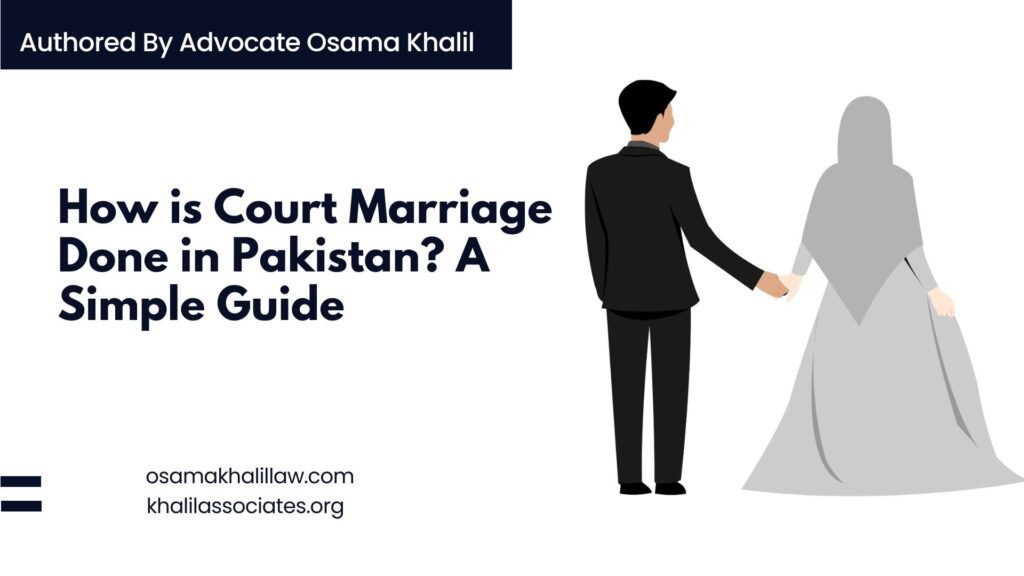
Court marriage in Pakistan is a legal way for couples to marry without traditional ceremonies. Many people prefer this method because it is quick, simple, and legally binding. The process involves submitting documents, appearing before a marriage registrar, and signing the marriage certificate.
Furthermore, court marriage in Pakistan is recognized under the Muslim Family Laws Ordinance 1961 and the Special Marriage Act 1872 for non-Muslims. Whether you want a registry marriage in Pakistan or a Nikah in court Pakistan, the steps remain straightforward.
Who Can Opt for Court Marriage in Pakistan?
Any adult man and woman can choose court marriage in Pakistan if they meet the legal requirements. The groom must be at least 18 years old, and the bride must be at least 16 years old. However, some provinces may have different age restrictions.
Additionally, interfaith couples or those avoiding lengthy wedding rituals often prefer a legal marriage in Pakistan through court. Even Pakistani nationals marrying foreigners can complete the process under Pakistani law.
Required Documents for Court Marriage in Pakistan
Before proceeding with court marriage in Pakistan, couples must gather the necessary documents. These include:
First, both parties need original CNICs (Computerized National Identity Cards). If either person is divorced or widowed, they must provide divorce papers or the death certificate of the former spouse.
Next, two witnesses with their CNICs must accompany the couple to the court. Moreover, passport-sized photographs of the bride, groom, and witnesses are mandatory.
Finally, couples must submit a written application for registry marriage in Pakistan at the local Union Council or Marriage Registrar’s office.
Step-by-Step Process of Court Marriage in Pakistan
Step 1: Submission of Application
The first step for court marriage in Pakistan is submitting the marriage application. The couple must visit the local Union Council or Marriage Registrar’s office with all required documents.
Then, the official checks the documents and verifies the details. If everything is correct, they schedule an appointment for the marriage registration.
Step 2: Notice Period and Publication
After submission, the Union Council issues a public notice. This notice remains displayed for 30 days, allowing anyone to raise objections.
However, if no objections arise, the process moves forward. In case of objections, the council investigates before approving the legal marriage in Pakistan.
Step 3: Oath and Affidavits
Before the marriage, both parties must sign affidavits stating they are entering the marriage willingly. They also declare their age, marital status, and consent.
Moreover, the couple and witnesses must take an oath before the marriage registrar. This step ensures the Nikah in court Pakistan is legally valid.
Step 4: Marriage Ceremony Before Registrar
On the scheduled date, the couple, along with two witnesses, appears before the marriage registrar. The registrar reads the marriage contract, and both parties agree to the terms.
Afterward, the couple and witnesses sign the marriage certificate. The registrar then officially registers the civil marriage in Pakistan and issues the Nikah Nama (marriage certificate).
Step 5: Obtaining the Marriage Certificate
Once the ceremony concludes, the Union Council issues the official marriage certificate. This document serves as legal proof of marriage and is required for visa applications, bank accounts, and other legal matters.
Couples should keep multiple copies of the certificate for future use.
Legal Rights After Court Marriage in Pakistan
After completing court marriage in Pakistan, both spouses gain legal rights. The wife can claim maintenance, inheritance, and dower (Haq Mehr). Similarly, the husband has rights to guardianship and marital obligations.
Furthermore, children born from a registry marriage in Pakistan are legally legitimate and entitled to inheritance under Pakistani law.
Challenges and Solutions in Court Marriage in Pakistan
Some couples face family pressure or societal objections when opting for legal marriage in Pakistan. However, the law protects their right to marry without interference.
Additionally, bureaucratic delays may occur, but hiring a lawyer can speed up the process. Couples should ensure all documents are correct to avoid legal complications.
Cost of Court Marriage in Pakistan
The total cost of Nikah in court Pakistan varies but is generally affordable. Fees include court charges, affidavit costs, and lawyer fees (if hired). On average, the process may cost between PKR 10,000 to PKR 30,000.
Conclusion: Why Choose Court Marriage in Pakistan?
Court marriage in Pakistan is a simple, legal, and cost-effective way to marry. It avoids lengthy ceremonies and ensures legal protection for both spouses. Whether for interfaith couples, quick marriages, or personal preference, civil marriage in Pakistan is a practical choice.
By following the correct steps and submitting the right documents, couples can complete the process smoothly. Always consult a legal expert if any confusion arises during the procedure.
Legal Assistance
For professional legal guidance and support in immigration matters, you may contact:
Mr. Osama Khalil
Lawyer & Legal Consultant
📞 Phone: 0316-1829946
📧 Email: contact@osamakhalillaw.com | contact@khalilassociates.org
